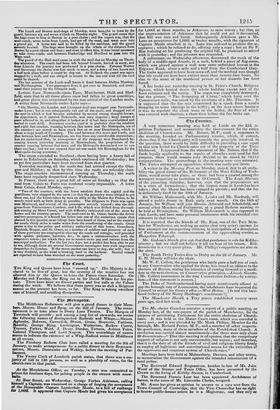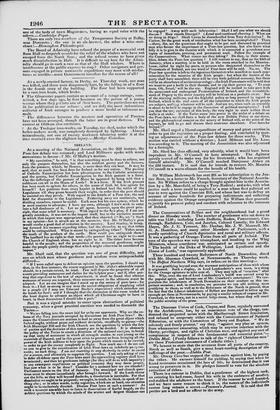The Ma , chester Guarthan contains a report of a public
meeting, on Monday last, of the rate-payers of the parish of Manchester, for the purpose of petitioning Parliament for the entire abolition of Church- rates. It was held in the Manor Court room, which was crowded in every part ; and it was attended by Mr. Mark Philips, Member for the borough, Mr. Richard Potter, M. P., and a number of other respecta- ble gentlemen, many of them members of the Established Church. A resolution was carried almost unanimously—for there were only about 20 dissentients—" That this meeting is of opinion, that the compulsory support of religion is not only unreasonable, but unjust ; and therefore, that it is the duty of all the friends of civil and religious liberty firmly to employ all legitimate and constitutional means for the extinction of the oppressive and vexatious system of Church-rates."
Meetings have been held at Malmesbury, Devizes, and other towns, to memorialize the Government against the intended introduction of a rural police.
The Reverend Edward Sergeantson, brother.in-law of Mr. John Wood of the Stamps and Taxes Office, has been presented by the Crown to the living of Kirkby- Steven, in Cumberland.
The Reverend Francis Lear has been appointed Archdeacon of Sarum, in the room of Mr. Liscombe Clarke, resigned.
Mr. Amos has given an opinion in answer to a case sent from the Town- Council of Cambridge, that the Vice. Chancellor has no right to license public-houses unless he is a Magistrate, and then only as
one of the body of town Magistiates, having an equal voice with the others.— Cambridge Paper. There are only two members of the Temperance Society at Balby, MEW Doneastei ; the one is an ale-brewer, the other a wine-mer- chant !—Birtninyham Philanthropist.
The Board of Admiralty have refused the prayer of a memorial sent from Hull to despatch vessels for the relief of the whalers who have not escaped from the North Seas ; and the refusal seems to have given much dissatisfaction in Hull. It is difficult to say how far the Adtni- salty should go in such a case as that of the Hull whalers. Where is interference at the public expense to stop ? Other navigators and per- sons engaged in private mercantile expeditions may meet with misfor- tunes as terrible—must Government interfere for the rescue of all?























 Previous page
Previous page